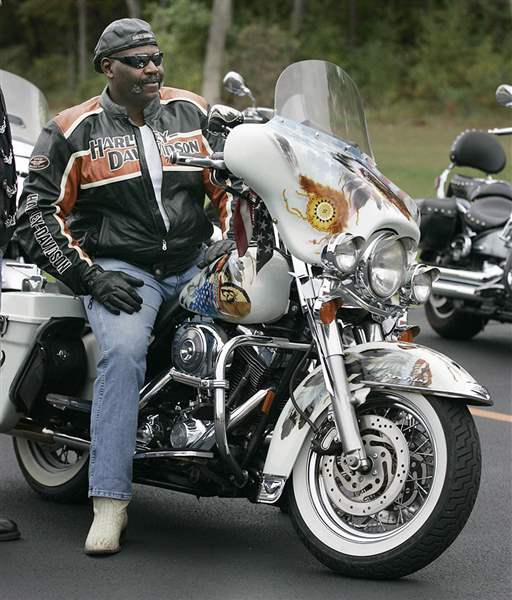
COMMENTARY
A mayor’s unique view of race
I think Mike Bell thinks of himself as a black man and a politician, but not a black politician.
9/11/2013
Toledo Mayor Mike Bell sits on on his Harley-Davidson motorcycle at the Harley dealership on Central Avenue during ‘Ride for Kids’ Sake’ in 2010.
THE BLADE
Buy This Image

Keith C. Burris
Some time in the last five years of his life, Johnny Cash was asked if he was a Christian singer. “I am a Christian,” Cash said, “and a singer. But I am not a Christian singer.”
I think Mike Bell thinks of himself as a black man and a politician, but not a black politician. This week I spoke with him about tonight’s 7 o’clock forum on racism at Woodward High School, co-sponsored by the Toledo Community Coalition and The Blade. He wanted to talk about his trip across America on his hand-painted Harley just a few years ago. Alone.
Mr. Bell said he took that trip to “learn America” and “find out for myself” about race in our country. When he told his parents he intended to make this pilgrimage, they were incredulous. They didn’t want him to go. They thought, the mayor said, “that I would surely wind up in a body bag.” He recalls seeing them in his bike's rear view mirror as he drove off: They stood frozen on the porch, their faces tight and grim.

Toledo Mayor Mike Bell sits on on his Harley-Davidson motorcycle at the Harley dealership on Central Avenue during ‘Ride for Kids’ Sake’ in 2010.
Mr. Bell went all the way to California, staying in hotels and taking a southwestern route because he loves western and American Indian culture. He didn't keep a diary, but he did collect some stories.
The beating his folks feared never happened, though there were a couple of tense moments. In a bar in Barstow a big nasty looking guy came up to him and asked: “Do you know where you are?” “Yeah,” said Mr. Bell, “a bar in Barstow.” The big guy shook his head, very slowly. “You are in a Hell's Angels bar.” And then he added: “I'm not telling you to leave. I just want you to know where you are.”
In Cheyenne, Wyoming, Mr. Bell noticed many signs that said: “Bikers welcome.” Why wouldn't they be, Mr. Bell asked. Well, there had been a bar fight recently and a biker had wound up dead. Just a fluke, he was assured. The town wanted bikers to know there was no generalized hostility. So Mr Bell went to that bar. And, sure enough, a huge white guy, the biggest guy in the place, sidled up next to him — a little inside Mr. Bell’s personal space. “Here we go,” Mr. Bell thought. The guy turned out to be a businessman, in town for just a few weeks, and a fellow football fan.
The stereotype was wrong.
Bell took the trip, in part, to test the stereotypes.
“You have to be able to adjust to where you are,” Mr. Bell said.
“Every American should be able to experience every facet of America.”
Mr. Bell believes that a person can shape how he is perceived and how a situation turns by his own attitude. Go in with a chip on your shoulder, he said, and you will find trouble.
Mr. Bell stops. He says he wants to be very clear: bigotry exists; racism exists, and it takes constant vigilance to keep the rules fair and create opportunities for others like the chances he had. No one makes it on merit alone, he said. You have to have help. He said he had plenty. And now it’s his duty to “reach back and help the guy coming up.”
But he said the way to attract help is to show what you can do. Growing up in the North End, he said, he and his friends were color blind, until the riots of the 1960s. “We called each other names for a week or so. And then we went back to who could hit the ball.”
At UT, on the football team, Mr. Bell ran into what he calls “the separatist concept.” White Southern Ohioans (“Where you from, man?” “St. Mary's.” “Where's that, Mississippi?” ) sat on one side of the cafeteria. Black players sat on the other. Bell toggled between the two. He learned that leadership “is all about relationships.”
Mr. Bell bristles at the notion that he is somehow “not black enough.” “What does that mean?” he asks. “Look at my skin. I can’t get much blacker.” But a mayor, he said, has to be mayor of all the people. He added that, in his life, he has been helped by all kinds of people. Including on his long ride across the country. “I found that America is pretty cool.”
Bell is not a Republican. But he is a conservative. I don't think he thinks government can do much about race or poverty. He thinks it's up to individuals, and families.
He tells me a story about a country western bar where he used to go. He was a regular. He had many friends there. One night a man came in for the first time, got drunk and started hurling the N-word at Mike Bell. To his surprise, the man found he was alone. No one was on his side. Mr. Bell walked up to him and looked him in the eye. People backed away. Mr. Bell bought two shots of whiskey and put one in front of the racist: “I know you hate me. But I don’t hate you. So you go on hating and I’ll just go on loving.”
“Right out of Dr. King’s playbook,” I say.
“My parents,” he says.
Keith C. Burris is a columnist for The Blade.
Contact him at:
kburris@theblade.com
or 419-724-6266.